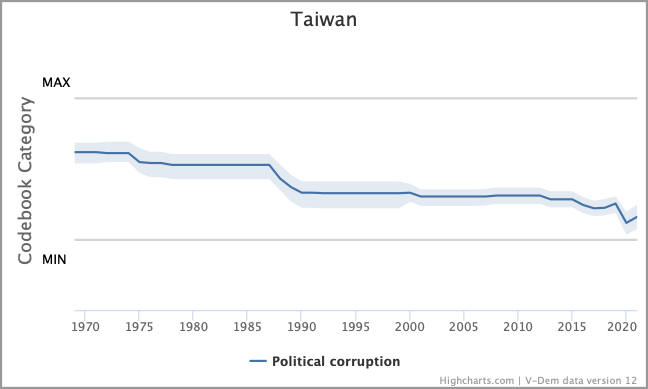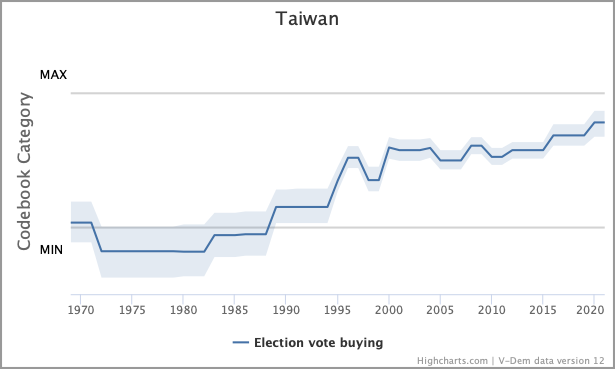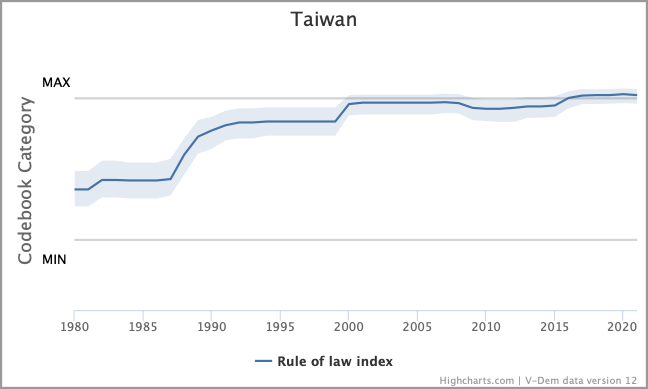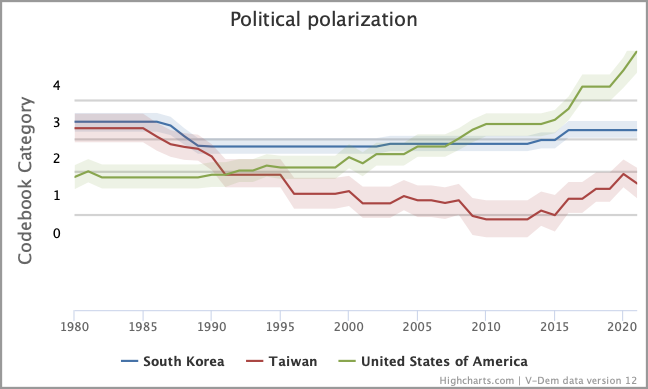How Democratic Is Taiwan? Evaluating 20 Years of Political Change
- Political corruption and "black gold" (黑金) politics
- Weak rule of law, including insufficient judicial independence and professionalism and widespread distrust of the courts
- Growing partisan polarization, especially around national identity (Taiwanese vs Chinese) and ethnicity (benshengren vs waishengren)
- Constitutional defects, including ambiguity over whether Taiwan is a presidential or semi-presidential system, and a problematic electoral system (SNTV).
- Weak support for democratic values among the mass public.
Here's the ranking and score for four prominent democracy indices used to rank overall quality of liberal democracy:
- Freedom House: Taiwan is 94/100, tied for 19th with Chile and Germany
- Economist Intelligence Unit Democracy Index: 8.99/10, 8th.
- Bertelsmann Transformation Index, 9.60/10, 3rd (of 137 non-OECD countries)
- Varieties of Democracy Liberal Democracy Index, 0.7/1, 32rd.
V-Dem is noticeably more negative than the other three on Taiwan (and much more positive on South Korea, for reasons that aren't clear to me.) So keep that in mind as we look at some of the V-Dem indicators below -- if there's systematic bias in the V-Dem estimates, they're probably too low rather than too high.
Here's the Varieties of Democracy indicator for vote-buying, 1969-2021, which shows some real improvement after 2015.

Here's V-Dem's Rule of Law index, 1980-2021. Roughly similar pattern, with some improvement starting 2015, although V-Dem is pretty positive on the rule of law even in 2001...
Finally, here's V-Dem's political polarization measure. The trend here is counter-intuitive -- it shows the Chen Shui-bian era as not particularly polarized, and significantly less than the previous Lee Teng-hui era, followed by a further decline in polarization until 2013, then significant increases since then.
This looks weird to me -- I've long thought the CSB era was the peak for polarization, and that it has declined since then -- but that's what the data show.
I've put two other countries on here for reference -- compared to South Korea and the United States, Taiwan doesn't look especially polarized at any point in the last 20 years. So despite the increases on this indicator in recent years, political polarization doesn't look like the fundamental threat to democracy that Diamond worried it might be back in 2001.
The paper has a lot more, but summarizing:
- Comparative indices generally show Taiwan to be a high-quality liberal democracy, and one that has registered important improvements since 2015.
- Since 2001, Taiwan has made significant progress in Diamond's five problem areas.
- The remaining weaknesses -- e.g. media sensationalism, distrust of judiciary, "direct democracy" agenda gone haywire -- are not especially unique to Taiwan and don't (so far) threaten the integrity of the democratic system.
- The biggest threat to democracy in Taiwan now comes from the People's Republic of China across the Strait, including CCP-backed influence campaigns.
Finally, this paper was inspired partly by accusations coming from some quarters in Taiwan that it is now an "illiberal democracy" or "electoral autocracy" under President Tsai Ing-wen and the ruling DPP. I wrote a blog post last December rebutting some of these accusations; this paper builds on the data and arguments there. The conclusion is the same: you really have to stretch to argue that Taiwan is in democratic decline. Most of the data point in the other direction: Taiwan's democratic system has addressed many of its most serious weaknesses since 2001, and even since 2015.





 RSS Feed
RSS Feed
